Without a doubt, Medium is a market leader in online publishing and blogging.
But, maybe most noticeable is Medium's Partner Program, which enables many writers to monetize their work with a few simple clicks.
However, Medium, like Tumblr, lacks customizing tools, making it difficult to stand out online and implying that your page will appear amateurish.

While Medium is likely the leader among these "pre-monetized" blogging platforms, other Medium alternatives are explored.
These alternative platforms can be used in place of or in addition to Medium. In addition, several allow content reposting, implying that these sites can at the very least act as content syndication platforms.
Now, have you thought about some alternatives to medium that are maybe even better, more user-friendly, and an excellent option for developers?
So, without further ado, let’s see some of the best Medium alternatives where you can relocate your blog!

What are blogging platforms?
Blogging platforms are broadcast-style communications systems that allow writers to post articles, comments, or customer feedback (referred to as posts) that can be distributed via the stand-alone site, email, feed syndication system, and social media platform.
By allowing user comments, blogging platforms also enable direct reader involvement with the host blogger or other blog users.
The fundamental difference between a blog and other websites is that the content published on a blog is displayed in reverse chronological order. The most recent additions to the site are shown first.
Types of blogging platforms
Numerous companies provide free or paid solutions for writing online and maintaining a blog. WordPress, Blogger, Weebly, Tumblr, and Medium are prominent free blogging platforms.
If all you want to do is keep a personal journal or share information with others, a free blogging platform will do.
However, if you’re going to make money online or use your blog for marketing gain, many experts suggest that you avoid free blogging platforms and instead pay for a self-hosted blog on WordPress.
On the other hand, even if you use a self-hosted blog with WordPress for your site, writing to a site such as Medium.com can help you reach more individuals and have them find you.
Advantages of blogging platforms

Here are some of the handy blogging statistics to be aware of:
Notable Blogosphere Statistics
- 31.7 million is the projected number of bloggers in the US.
- 42% of the web is built on WordPress.
- 77% of people regularly read blogs online.
- Successful bloggers spend 4 hours on average to write a post.
- Around 7 million blog posts are published per day.
- 67% of bloggers who post daily say that they are successful.
- Blog articles with 3000+ words get better results.
- 97% of bloggers use social media to boost their results
- 61% of online users in the US have bought something after reading a blog
One of the benefits of having a blogging platform is that it makes it simple to optimize your blog for search engines. Many blogging platforms will allow you to include metadata, which helps search engines understand what your site is really about. That information typically consists of a headline, a description of your content, and some associated keywords.
Moreover, one of the keys to receiving free traffic from search engines is to post high-quality, original material regularly—and providing fresh content to your website by blogging regularly is an excellent method to do this. You should conduct keyword research to see what topics people are searching for.
Another potential benefit of blogging is making income from it: There are numerous methods to use a blog to earn money online. For example, you can use your blog to sell e-books online, advertise other people's products, make money as an associate, or promote your personal goods and services.
Just keep in mind that with many free blogging platforms, you are only permitted to use your blog for private purposes and are not permitted to use it for business reasons. So if you intend to make money from your own blog, make sure you select a site that enables commercial use or just self-host your blog on your hosting account.
Key takeaways
- A blogging platform is a piece of software or a service that allows users to create, control, and publish information in a blog on the internet.
- Blogging platforms typically publish content in reverse chronological order, with the author's name and the date visible.
- There are numerous free and paid blogging platforms available and website builders with blogging features.
- Blogging regularly can help individuals locate your business online, and you may even be able to profit from it.
Alternatives to Medium: types of alternatives

When we say "Medium alternatives," we genuinely mean two kinds of alternatives: direct Medium alternatives and indirect Medium alternatives.
Direct Medium alternatives
Direct Medium alternatives are platforms that use a "pre-monetized" payment mechanism similar to Medium's Partner Program. You write, post, and can instantly activate monetization through the platform for direct Medium alternatives.
Even though the payment systems vary by platform, they are all similar. They seek to increase traffic to your content and reward the most compelling articles with more considerable compensation.
Indirect Medium alternatives
Indirect Medium alternatives are digital publishing venues that many Medium writers utilize in addition to or instead of Medium. These platforms, like Medium, enable writers to post and monetize digital material.
Such platforms, however, depart from Medium and its direct competitors in that they lack a pre-monetized payment system. Instead, the writer’s responsibility is to market their content, attract traffic, and monetize their work through third-party services.
Below you can see a list of the best alternatives to medium. Let’s start!
The best medium alternatives for developers
Numerous free blogging platforms are available on the internet, so starting a blog does not have to be an expensive endeavor. You may quickly discover a free blog site that meets your needs, ranging from fully-featured blogging platforms like Squarespace and WordPress to more basic blogging platforms like Medium, Wix, and Weebly.
Here is a list of the best Medium alternatives that you can use to start and grow your own blog or website.
Hashnode
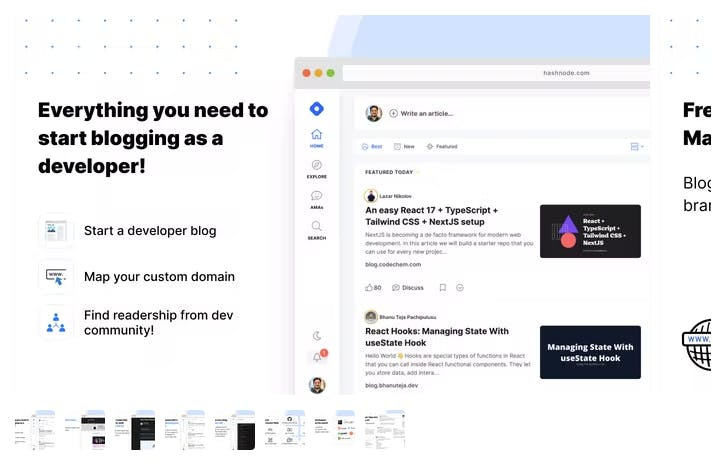
Among the best medium alternatives for developers is Hashnode.
It is a free developer blogging platform that enables software developers and tech enthusiasts to publish articles on their custom domains while also linking them to a growing developer community.
Hashnode is a high-performance, safe, and completely optimized blogging platform developers adore.
With Hashnode, you may create an online identity and post, distribute, or find development-related material.
In addition, it allows you to share your thoughts and opinions with other experts in the business.
You may also write about anything you choose, from lessons and tips to personal stories, and get compensated for it—all on your own domain. So what’s the most remarkable thing about Hashnode?
There are no adverts or paywalls with a lifetime free plan, and you have full ownership of your work.
Hashnode features
Hashnode provides an easy-to-use design and tools that allow you to post and share your material without any previous blogging expertise. The following is a list of Hashnode features:
- Automatic GitHub backup
- Write in Markdown
- Superfast Next.js powered blogs
- Blog on a custom domain name
- Free SSL certificate
- Content drafts
- Content organization
- Export and download all your posts
- Retain ownership to your content
- Edge caching with SSL
- Custom design
- Free built-in newsletter service
- Built-in analytics
Hashnode allows you to build a personal blog that you can modify whatever you like. Visit Hashnode to learn about ideas, tricks, and tutorials for creating a unique blog that reflects your individuality!
Hashnode reviews
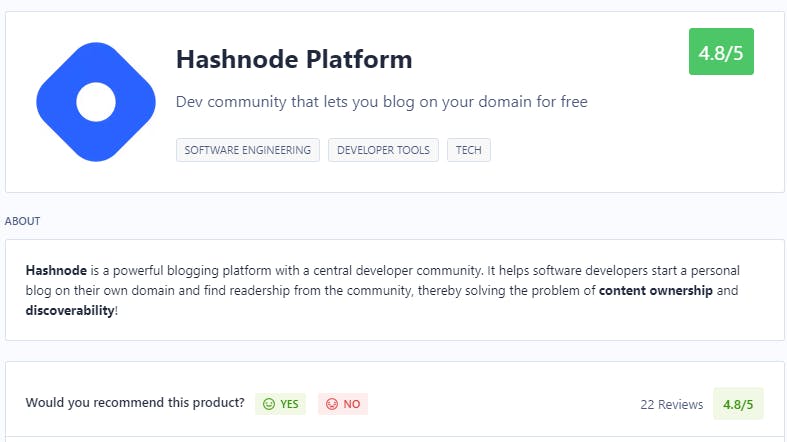
The Product Hunt rated Hashnode 4.8 out of 5 based on 22 user reviews.
Positive feedback
“Early adopter here. I switched my blog from WordPress to Hashnode. What's the story? Well, I got tired of being in charge of how my blog will look and feel. I want to write blogs, not to worry, is my font 12pt or 14pt. Should I put width 720px or 1200px. And with the WP, you have all the customization you need. And that was killing me. I need a refreshment. Some "opinionated" platform where the look and feel is predetermined and optimized. With a community.
I have to emphasize the support from the founders in the early days (via Twitter). They really wanted to get new users. And guess what, they were offering good things in return. Free domain, and even linking your domain to your hashnode blog. And the community is constantly rising. And you really feel being part of it. Probably I couldn't get that by joining [dev to], which is already massive.
You know what is also great about Hashnode
- they republish your content on other platforms (Reddit, hackernews) if they like your blog posts.
- they allow non-dev blogpost (just mark it as a non-dev, and it won't go to the hashnode dev community but will stay on your blog)
- there's a Request For Articles section where members are requesting articles, and you can see which articles have already high demand.
Hashnode team is also organizing dev writing bootcamps where they teach people how to write technical blogs more effectively.
All in all, a bit of refreshment on a dev blogging platform scene. Recommendations to try it.” - Bruno Raljić
Negative feedback
On Product Hunt, Hashnode has gotten nearly 5 out of 5 ratings and so far we can't find a negative review. However, some people might find the markdown editor a bit chalenging.
Hashnode pros
- Free Custom Domain Pointing
- Free SSL
- Blogging with Dev Community
- No ads or paywall
- Github Backup
- In-built Newsletter
- Syntax highlighting
- Rich Embeds
Hashnode cons
- Fully optimized for tech enthusiasts and software developers
- Writing in Markdown can be difficult for non-tech bloggers
HubPages

HubPages is a revenue-sharing website based on user-generated content created in 2006.
In 2016, the company transitioned from a single-site to a multi-site business model.
The platform allows you to post articles and generate income based on the number of views they obtain.
HubPages is less popular than Medium, and its writers do not often earn as much as their Medium colleagues, but it does have a built-in monetization system.
The HubPages writer payment system is based on a formula that mainly measures page views and the contribution of your content to the success of display ads.
HubPages features
As a platform with user-generated content at its foundation, HubPages allows users to engage in forums on specific themes, post questions and answers in its Q&A area, comment on other people's work, and follow other members.
So far, the site has had 29 million views every month.
In addition, over 700,000 articles have been published on over 46,000 hubs, and over 4.1 million forum entries have been made.
You can improve visibility by sharing your content on social media channels like Facebook and Twitter. Additionally, readers can post comments and other feedback on your articles.
HubPages reviews
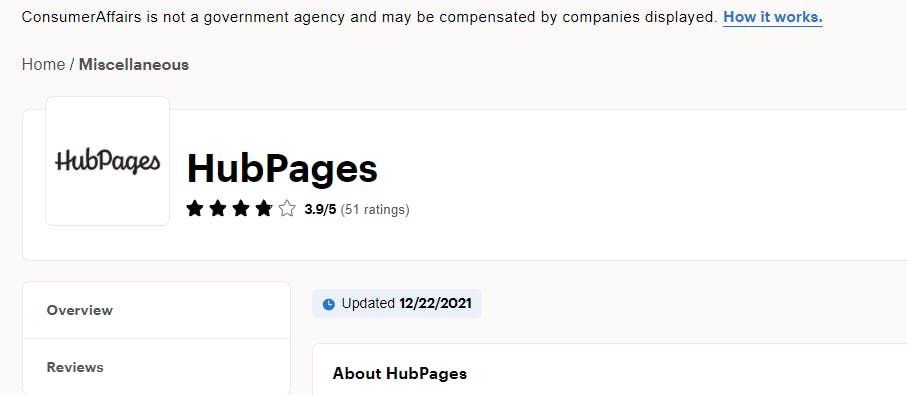
On ConsumerAffairs, HubPages has a 3.9 out of 5 ratings based on 51 reviews.
Positive feedback
“I have written articles on HubPages for years, and they don't do any of the things mentioned by the negative reviewers here who complain about sales pitches, web hosting, SEO promises, and so on. I believe these people have mistaken HubPages for HubSpot, a site which very well might do those things. HubPages doesn't have anything to sell, including services, and they don't host websites. It's just a free platform where people can submit articles for (possible) publication. If you're lucky and work really hard, you can get a little payment for your articles, too. Just hoping to clear up this misleading situation. HubPages is not the site described by some of these reviewers!” - Verified Reviewer.
Negative feedback
“Signed up for their service and decided within 2 days to not continue with their product. Called and was advised by Greg - No Problem, we will refund your $139.99 and your web name will not be further developed. Another agent will be calling to finalize the termination. Another agent, Ashley, called and said they would dispute the cancellation and would not release the web name. Called my CC company and disputed the charge. Not an honorable company in my opinion.” - Verified Reviewer.
HubPages pros
- No fees are required to join the platform
- It’s an excellent way for amateur writers to gain an online presence
- Articles on HubPages rank easier on search engines due to the website’s strong reputation
- There is an opportunity to earn from your content
- Simple set up process—no blog configuration required
- Helpful customer support
HubPages cons
- Not as beneficial to professional bloggers
- Numerous ads being shown on your blog pages can be a turnoff
- You have minimal creative control over the look and feel of your hub
- HubPages admin has the final say as to whether your posts get published or not
- Customer support is limited to email
Ghost

As one of the best medium alternatives for readers and writers, Ghost is a blogging platform for authors and journalists that is open source.
It has a simple and easy user interface that makes blogging easier for its users. In addition, ghost includes SEO tools and plugins with the software, making it simple for users to optimize their material.
The platform powers blogs, journals, and journalists ranging from Zappos to Sky News. Amateur authors and skilled editors from prominent media organizations use the Ghost platform.
Ghost's primary focus is blogging, and they have purposefully kept the interface and functions basic. That makes their site user-friendly for newcomers while also keeping their UI clean and clutter-free.
Ghost features
Ghost includes built-in SEO capabilities and statistics to assist you in improving your website and client experience. It also consists of a subscription feature that is ideal for content creators that want to monetize their audience.
You can create a payment gateway and sell access to your content using the membership option. Ghost and Hashnode have similar features as blogger alternatives to Medium magazine—however, Ghost has less robust features.
- Great free plan for advanced website developers
- Fully managed hosting
- Themes and customization
- Ghost editor and publisher
- Content gating
- Newsletter
- Integrations
- SEO features
- Team management
Ghost reviews
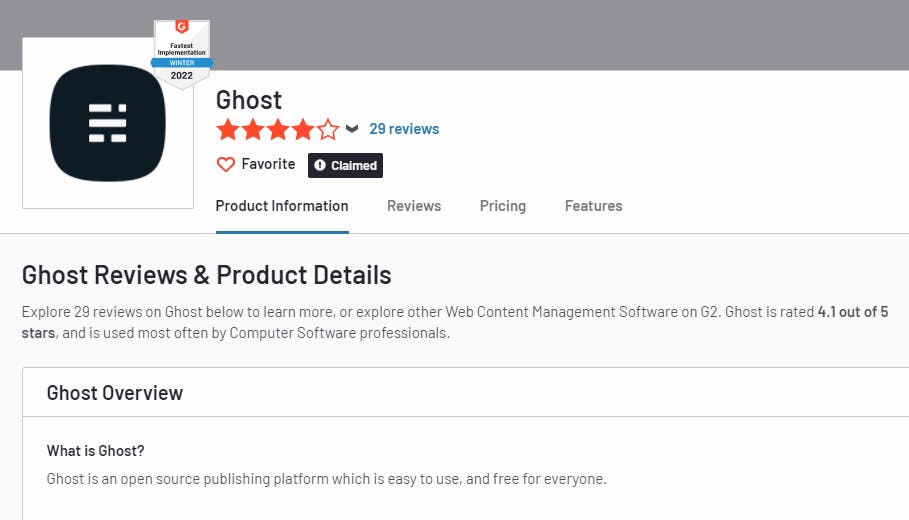
The G2 rated Ghost 4.1 out of 5 based on 29 user reviews.
Positive feedback
“I love the simplicity of the ghost platform, it's literally exactly what I need and want. Something simple, elegant, and the integrated email feature is stellar. I'm grateful for ghost; the simplicity yet depth of possibility (for example with Zapier integration) feels quite refreshing. The platform appears to be unlimited in possibility.” - User in Professional Training & Coaching.
Negative feedback
“There is a drawback with the most recent update, in that it feels like there's less easily accessible control. Whilst this is in some ways 'safe' and makes life easier in the first instance, when there's something you really want to customize (e.g. more than just two heading sizes, or varying/embedded imagery), it becomes a difficult task.” - User in Computer Software.
Ghost pros
- You retain independence
- Ability to use a custom domain
- Multiple theme options
- No ads or popups
Ghost cons
- The hosted version is paid
- No commenting system
- No network effect
Joomla

Joomla is a free and open-source content management system for publishing web content on websites.
It’s often written Joomla! and is commonly abbreviated as J! Joomla, is designed for blogging and content publishing.
It's a secure bet for anyone who wants to express themselves without worrying too much about aesthetics or customization.
Joomla does not have a particular market in mind. If you don't require a website — if you're more of an offline firm and only need a site to serve as a relevant placeholder - Joomla would suffice.
Though it can be used for corporate websites, Joomla is most likely ideal for small businesses and individuals.
Joomla features
Joomla is unquestionably a "basics-only" builder, yet several elements are worth mentioning despite its limitations.
The simplicity of usage can vary depending on how sophisticated or customized you want. On the surface, it appears to be relatively straightforward to use. You can click on a segment, write a page, and post it linearly by clicking on it. However, if you want customizations, templates, extensions, or even SEO capability, the situation becomes complicated.
- Extensions
- Global reach
- User management
- Platform options
Joomla reviews
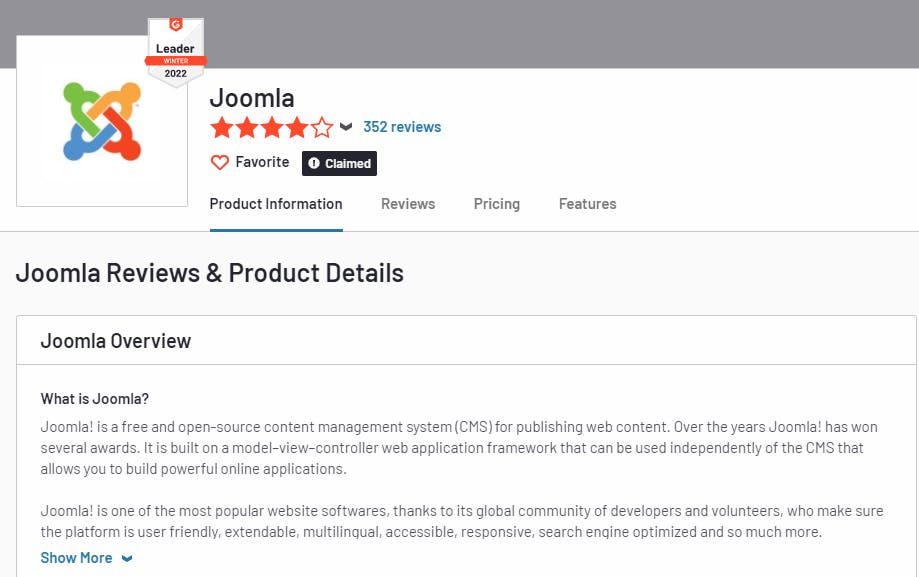
On G2, Joomla has a 4 out of 5 ratings based on 352 reviews.
Positive feedback
“With Joomla, we have started to enjoy the advantages involved in producing our websites, how to save time, money and adapt them to our needs when necessary. It has taken minimal training to start using it, plus it has an extensive support community and online tutorials. I love that it has many web design templates; it simplifies many things.” - Grace M, Program Manager.
Negative feedback
“Joomla has historically lacked the intuitive nature that other platforms like Craft or WordPress have, for the standard website owner admin user. Simple tasks like navigation menu management require two or three extra steps to achieve. The organization of content and modules is confusing to a non-developer, which makes the developer-to-end-user relationship difficult. It has also been difficult to upgrade from version to version. It is not easy for an average website owner or entry level administrator to maintain the site, which makes for serious headaches on security vulnerabilities and a bigger expense when you do need to upgrade and overhaul it.” - Jacqueline S, Managing Director.
Joomla pros
- It is an open-source platform
- It is capable of supporting e-commerce
- It is straightforward to edit
- It is still helpful for developers as well.
- There is plenty of support available
Joomla cons
- There are only a few additional modules available
- It can place a greater demand on your server resources
- You must navigate through paid plugins
- Adjustment options are rather limited
WordPress.org
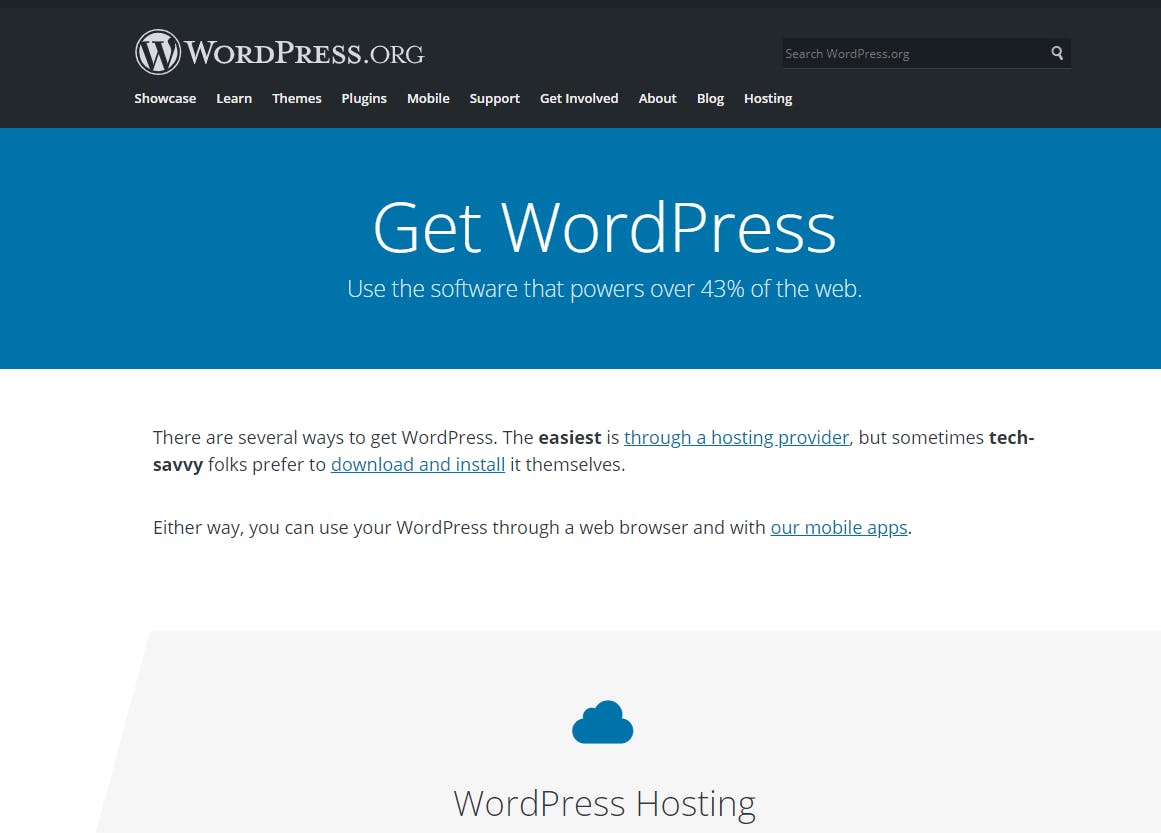
WordPress is software intended for everyone, one of the medium access alternatives emphasizing accessibility, performance, security, and usability.
But, to be honest, excellent software should require little setup so that you can concentrate on freely sharing your stories, product, or service.
WordPress.org is a content management system (CMS) where you may create or host your own blog with a hosting service provider.
WordPress.com, on the other hand, is comparable to other free blogging platforms in that you build your blog on their website.
WordPress.org is an open-source blogging platform that is self-hosted. This is also the most profitable blogging platform. Unfortunately, you cannot sign up directly with WordPress; instead, you must sign up with a hosting company and install WordPress software.
WordPress.org features
WordPress now powers more than 43% of the internet, a number that is growing by the day. WordPress creates everything from modest websites to blogs, sophisticated portals, enterprise websites, and applications.
- Simplicity
- Flexibility
- Publishing tools
- User management
- Media management
- Full standards compliance
- Search engine optimized
WordPress.org reviews
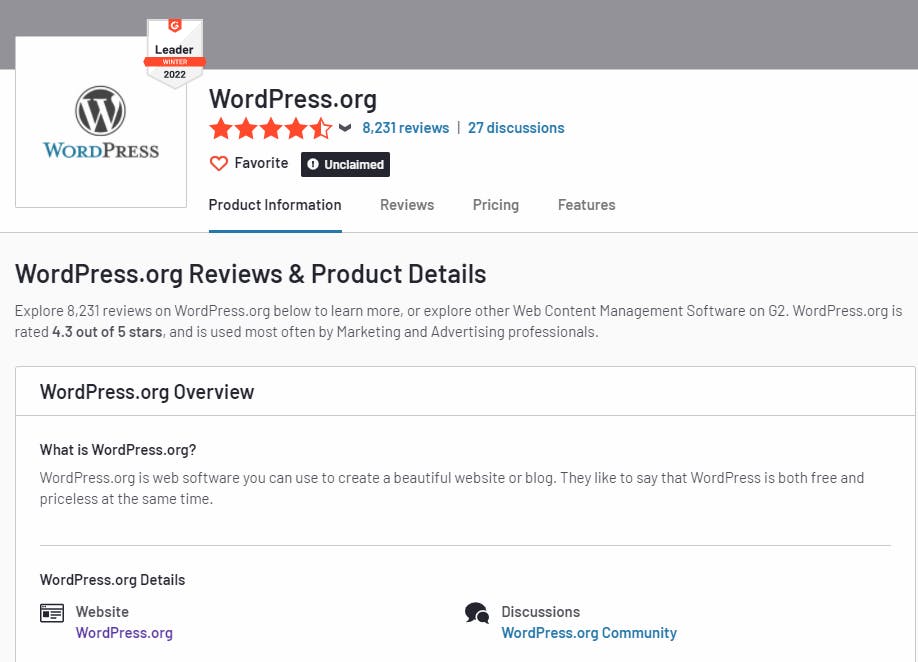
The G2 rated WordPress.org 4.3 out of 5 based on 8,231 user reviews.
Positive feedback
“Though the initial focus of WordPress was as a blog publishing platform, the thriving third-party and community-built plugins and extensions have long since established it as a full-fledged content management system capable of handling endless varieties of website configurations. From simple brochure sites extolling the virtues of a single product or brand to e-commerce marketplaces built with WooCommerce and Shopify, WordPress offers web developers a standardized management interface with familiar controls and (for the most part) intuitive components regardless of the content being managed.” - Josef C, Automation Director,
Information Technology and Services.
Negative feedback
“Super difficult to use. While the existing templates are amazing, they are really limited if you already have a specific theme or vibe in mind. Getting the cooler functions are eye-catching interaction widgets usually require some knowledge of coding. I made several pages for my own site before my patience ran out and I had to ask someone else to continue the work.” - Floraine C, Concierge.
WordPress.org pros
- Complete control
- Flexibility and customization
- Monetization
- Scripts
- Create an online store
- Create a membership site
WordPress.org cons
- Even though WordPress is a free platform, self-hosted WordPress websites require the purchase of a domain name and web hosting
- It is your responsibility to keep the WordPress core, themes, and plugins up to date
To summarize
Hashnode is a free developer blogging platform that allows software developers to publish articles on their own custom domains and connect them to an expanding developer community.
On the other hand, HubPages has similar features, as it is entirely free, and you don't need to download anything or do anything complicated. However, it features numerous ads that can bother users.
Ghost is an open-source blogging platform for authors and developers. Its main con is that the hosted version must be paid for.
Joomla is also quite similar to previous platforms—however, it is quite “basic” and lacks a few additional features that other platforms have.
And finally, we have WordPress.org, which is pretty similar to Joomla in terms of simplicity and user-friendliness.
However, you will have to do manually most of the features that need to be updated.
Here’s the comparison table of all five:
| Hashnode | HubPages | Ghost | Joomla | WordPress.org | |
| Developer-friendly | ✓ | somewhat | somewhat | ✓ | ✓ |
| Simple to use | somewhat | somewhat | somewhat | ✓ | ✓ |
| Automatic updates | ✓ | ✓ | ✓ | limited | ✖ |
| Ads | ✖ | ✓ | ✖ | ✖ | ✓ |
| Publishing tools | ✓ | limited | ✓ | limited | ✓ |
In the end, each platform has its pros and cons, and you should go for what suits your needs the best. If you want a developer-friendly and a free lifetime plan without ads, give Hashnode a try!
FAQ
Is Medium the best platform?
Medium is among the best platforms for writers, whatever the industry. However, it does have a few drawbacks, like censorship and making it complicated for writers to stand out online with their articles.
What are Medium alternatives?
Some of the best Medium alternatives include Hashnode, WordPress.org, Ghost, and more.
What can I use instead of a Medium?
There are plenty of options when it comes to blogging platforms. It all depends on what features you are searching for. Some of the options are Hashnode, HubPages, WordPress.org, WordPress.com, Squarespace, and mor